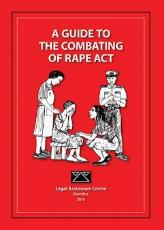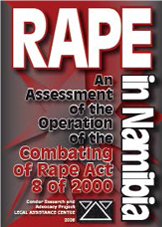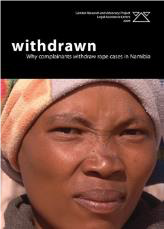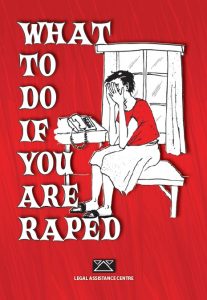
Combating of Rape Act
GR&AP assisted in the development of Namibia’s progressive rape legislation, the Combating of Rape Act 8 of 2000, which came into force in 2000. GR&AP mobilised civil society to promote amendments to the bill initially proposed by the government, most of which incorporated into the final version of the law.
The Combating of Rape Act contains a new, gender-neutral definition of rape which abandons the concept of absence of consent in favour of a focus on the presence of coercion. The law provides for minimum sentences for different categories of rape. It also contains a range of provisions aimed at meeting some of the needs of the rape survivor — such as increased privacy protections and procedures designed to ensure that the rape survivor has an opportunity to place information before the court at the bail hearing. The Act came into force in 2000.
Read newspaper articles from our archive relating to the reform of the law on rape:
- A case against mandatory HIV testing of rapists (1997)
- Age of consent (part 1 and part 2) (1997)
- An overview of the Combating of Rape Bill (1999)
- Making rape in marriage illegal (1999)
- Rape redefined: A summary of the new Combating of Rape Bill (2000)
- Making false statements and laying false charges: The consequences (2007)
- Is it really rape? (2011)
- How should rape cases be dealt with in Namibia? (2011)
- On the right to wear miniskirts (2013)
- Bail in cases of GBV (2014)
- Denying parole for GBV offenders (2014)
- Longer prison sentences for GBV: Will they help? (2014)
- The legal changes we need most to combat GBV (2014)
- Rape and the duty to protect persons with disabilities (2017)
- Abortion in the case of rape (2017)
- Preventing convicted abusers from working with children (2018)

GR&AP has produced a detailed Guide to the Combating of Rape Act aimed at service providers.
GR&AP has hosted workshops to train police, social workers, prosecutors, magistrates and medical professionals on the Act. In 2005, GR&AP published Guidelines for Service Providers on the Combating of Rape Act of Namibia, intended for persons in these professions who deal with rape survivors. The Guidelines were developed by the professionals themselves and compiled by GR&AP.
GR&AP has also prepared a training DVD on rape aimed at prosecutors and persons who seek to support rape survivors during their court experience. This DVD is available from the LAC office.
GR&AP has also prepared a short memo on how courts have interpreted substantial and compelling circumstances in rape cases, intended as an aid for judicial officers.
Educational materials for the public
GR&AP has produced a range of publications containing simple information about rape, aimed at rape survivors, their families and organisations which support rape survivors:
- Pocket guide to the rape law available in English, Oshiwambo, Afrikaans and Otjiherero
- Factsheet about the rape law (can be printed as a poster) available in English, Oshiwambo, Afrikaans and Otjiherero
- Booklet: What to do if you are raped available in English, Oshiwambo, Otjiherero and Afrikaans
- Booklet: Bail in cases of rape and domestic violence available in English, Oshiwambo, Otjiherero and Afrikaans
- Booklet: What to expect in court available in English, Oshiwambo, Otjiherero and Afrikaans
- Booklet: Reasons not to withdraw a rape case available in English, Oshiwambo, Otjiherero and Afrikaans
- Comic: Date rape available in English
- Comic: Domestic violence, HIV and the cycle of violence available in English, Damara, Oshiwambo and available in factsheet/poster format in English
- Comic: The links between HIV and GBV available in English, Damara and Oshiwambo and available in factsheet/poster format in English
- Article on obtaining a legal abortion where a rape has resulted in pregnancy.
Combating of Rape Act Public Trainer Amendments to law
Film
GR&AP has produced a feature-length film called Love and Respect, which examines rape and domestic violence in local settings. The film is available in five languages (English, Afrikaans, Nama/Damara, Oshiwambo and Otjiherero). You can contact the LAC office to buy or rent a copy of this film.
Research
In 2007, GR&AP published an extensive study entitled Rape in Namibia, analysing police statistics and using information from court dockets to assess how the Combating of Rape Act was working in practice. This report is available in both full and summary versions. For a quick look at the key findings, see the press release issued at the time.
An amendment bill based in large part of the findings of this study is expected to go to Parliament during 2019.
The initial rape research revealed that complainants request withdrawals in more than one-third of all rape cases in Namibia. GR&AP explored the reasons for case withdrawals in a qualitative follow-up study, Withdrawn, published in 2009. The most commonly-cited reasons for requesting a withdrawal are listed below.

Suggested reason for rape complaint withdrawal:
1. The woman received compensation.
2. The woman was pressured by her family to withdraw the case.
3. The woman feels ashamed that she was raped .
4. The rapist physically threatened the woman to withdraw her case.
5. The timetable for the prosecution of a rape case is too long .
6 . The woman feels that she has insufficient evidence to win her case.
7. The woman lacks the necessary information.
8 . The rapist occupies a position of status in the community.
9. The woman was bribed to withdraw her case .
10. The woman is in a position of financial distress.

Proposed amendments
On the basis of research conducted by GR&AP, Namibia’s statutory Law Reform and Development Commission proposed amendments to the Combating of Rape Act to refine it. These amendments cumulated into the Combating of Rape Amendment Bill 2022 which was tabled in Parliament by the Minister of Justice on 22 February 2022. This Bill fine-tunes and strengthens the Combating of Rape Act.
What to do if you are raped:
1. Do not wash your body or change your clothes.
This would destroy signs of the rape which can be used to make sure that the rapist is found guilty in court. Do not tidy up the place where the rape happened. Do not wash anything which might have evidence such as blood or semen on it. Wrap items in newspaper for safekeeping – do not put anything inside plastic packets as plastic can damage the evidence.
2. Go to a doctor, clinic or hospital.
You must get medical help right away. You might want to go to a doctor, clinic or hospital even before you go to the police, especially if you have been hurt. You must be sure to explain that you have been raped. If you go to the police first, they will take you to the hospital or clinic.

- Get PEP immediately.
PEP (post-exposure prophylaxis) is a medicine which can greatly reduce the chances of being infected with HIV as a result of a rape. It works only if it is taken immediately after the rape and continued regularly for 1 month. The course of medicine MUST begin with 48 hours of the rape, or it will not work. - Ask the doctor about medicine to prevent infection with other sexually-transmitted diseases such as syphilis or hepatitis. It is also best to start taking this medicine as soon as possible.
- If you could be in danger of falling pregnant from the rape,ask your doctor for pills that can prevent a pregnancy. These pills will work only if they are taken right after the rape.
- Get information about follow-up testing.It is important to be tested at the right times for HIV, and for other diseases that could result from the rape and for pregnancy. You can also get counselling which will help you to feel less afraid about having these tests.
3. Lay a charge with the police.
You should report the rape to the police so that the person who raped you can be caught. This might prevent the rapist from raping someone else. Contact a GBV Investigation Unit if possible, as the police in these units have specialized training on dealing with rape cases. The police can help you get to a hospital or a clinic. They can collect evidence that will be helpful in the court case. You should bring a change of clothes with you to the police station so that they can keep the clothes you were wearing during the rape as evidence. If you are afraid that the person who raped you may come back and hurt you, be sure to tell the police. If you have a good reason for being afraid, then the person who raped you will not be set free on bail.
Read the pamphlet What to do if you are raped for more information.
Also available in Oshiwambo, Otjiherero and Afrikaans.



